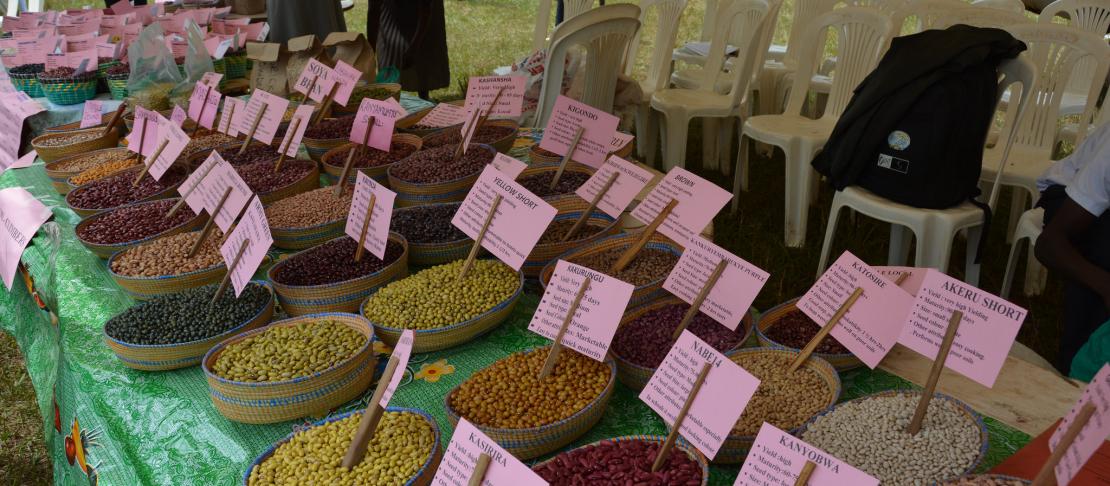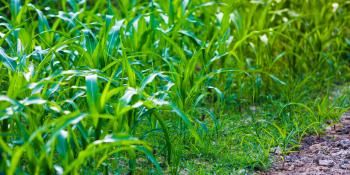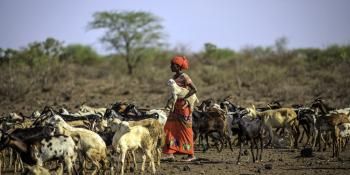The future of banking is in seeds: Hoima district establishes a community seedbank to strengthen farmers' adaptive capacity

Highlighting the key role and position of small-scale farmers and the community in conserving and managing plant genetic resources.
Every good thing starts from a good seed.”
Dr Sylvester Baguma, Director of research at Bulindi Zonal Agricultural Research and Development Institute (BUZARDI)
On 4 August 2018, over 1200 farmers, researchers, development partners, political leaders, and Ugandan government officers from Hoima District gathered in the CGIAR Research Program on Climate Change, Agriculture and Food Security (CCAFS) Hoima Climate-Smart Villages (CSVs) in western Uganda to celebrate the launch of the Hoima community seedbank.
The community seedbank is a repository of local genetic diversity that is adapted to the prevailing climatic conditions and is useful for contributing to community-based strategies for adaptation to climate change. At the launch event, Eva Kugonza, the Chairperson of the Hoima community seedbank, said:
“One of the purposes of our community seedbank is to serve as an emergency seed supply when our fellow farmers have a shortage of seeds, due to crop failure or occurrence of pests, diseases and droughts. Making seeds of both local and improved varieties available will help us achieve more yields through the cultivation of a variety of crops. Fellow women in the community will play a key role in the development, maintenance and promotion of different crop types, because of our role in selecting and saving seeds and raising awareness on the importance of traditional varieties.”
The community seedbank performs three key functions:
- It is responsible for the conservation of plant genetic resources for the community.
- It facilitates access and ensures the availability of diverse seeds and planting materials based on farmers’ needs and interests.
- It ensures seed and food sovereignty for the households.
“This seedbank will act as Hoima farmers’ savings for future crop production," said Dr. Dr. Ambrose Agona, the Director General of Uganda’s National Agricultural Research Organization (NARO), who was the chief guest at the event. He added, "Just like we put our savings in a regular bank, and whenever we need extra money we take out our savings. It will, therefore, serve to cushion the local community against crop losses, ensuring seed security and subsequent food security. The women in our community will benefit more by accessing better seeds because they are more disadvantaged economically. We will promote this innovation country-wide."
See the photos from the event:
The event also included a national seed fair which created a platform for all community seedbanks in Uganda to display their genetic diversity. In addition to the NARO Director General, the event was attended by local politicians like the Hoima District Local Council-Five (LC5) Chairman, Mr. Kirungi Kadiri, and government leaders like the Hoima District Resident District Commissioner (RDC), Mr. Ekongo John Steven, demonstrating the political will to support the initiative.
The event also attracted farmers from Kenya, specifically from the CCAFS Nyando Climate Smart-Villages in Kericho and Kisumu counties, as well as farmers from Seed Savers Network in Nakuru County. Farmers from Tanzania also participated in the event. All of these farmers carried seeds from their communities for the farmer-to-farmer exchange. There was a lot of excitement in the air as farmers displayed their seeds and visited different booths to learn from each other.
The launch and seed fair were instrumental in highlighting the key role and position of small-scale farmers and the community within the agricultural complex, especially in conserving and managing plant genetic resources. Moving forward, CCAFS and Bioversity International will collaborate with other like-minded partners to establish community seedbanks in other CCAFS Climate-Smart Villages in East Africa.
Read more:
- Bioversity International: Community Seedbanks
The success of the community seedbank establishment is attributed to the collaborative efforts of a diverse range of partners. The local community-based organization, Kyabigambire farmers' organization, which was started by CCAFS in 2013, donated the piece of land for the construction of the seedbank. Funding for the construction of the seedbank was provided jointly by CCAFS and Bioversity International. The support from Bioversity is part of a project on Open Source Seed Systems for Climate Change Adaptation funded by the UN Food and Agriculture Organization (FAO) and the European Union through the Benefit Sharing Fund of the International Treaty for Plant Genetic Resources for Food and Agriculture (ITPGRFA). The community seedbank construction process was supervised by the National Agricultural Research Organisation (NARO) of Uganda.
John Recha and Catherine Mungai work with the CCAFS East Africa Regional Program. Chrispinus Mutsami works with Sustainable Agriculture and Natural Resource Management Africa (SANREM AFRICA).



